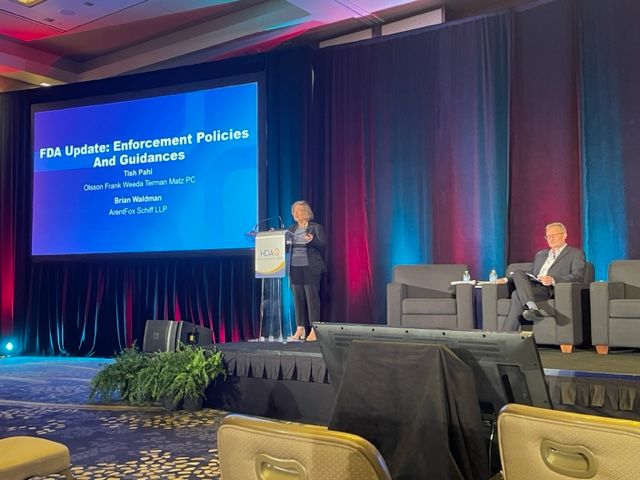HDA 2023 Traceability Seminar: A Synopsis of FDA’s Enforcement Policies and Guidance Updates
Pharma Commerce provides a summary of conference breakout session.
HDA 2023 Traceability Seminar session, “FDA Update: Enforcement Policies and Guidances.” August 30, 2023. HDA 2023 Traceability Seminar, Washington, DC. Image Credit: © Nicholas Saraceno.

Pharma Commerce was in attendance at the first day of this year’s HDA Traceability Seminar in Washington DC, and as part of the events breakout sessions, a specific conversation focused on updates from the FDA.
“FDA Update: Enforcement Policies and Guidances” featured Tish E. Pahl, principal, Olsson Frank Weeda Terman Matz PC, and Brian P. Waldman, partner, ArentFox Schiff LLP. In a joint effort, the two discussed new initiative being enacted by the government agency. Topics included:
- EDDS Compliance Policies
- Verification Compliance Policies
- Waivers, Exceptions, and Exemptions Final Guidance
- Pending Guidances
- Enforcement
- Lessons from Safe Chain Warning Letter and Diamantstein Indictment
Effective as of Aug. 25, the Enhanced Drug Distribution Security (EDDS) compliance policy is considered a final guidance for trading partners under the requirements of the enhanced Federal Food, Drug, and Cosmetic Act (FD&C Act). According to the FDA, the policy is “intended to help partners guarantee access to prescription drugs as the supply chain transactions to the electronic product tracing at the package level under the Drug Supply Chain Security Act (DSCSA).” However, it was recently revealed that via Section 582(g)(1) of the FD&C Act, FDA “does not intend to take action to enforce” rules on exchanging product transaction data, reporting such data to regulators, or verifying salable returns against transaction data (apart from existing methods of verification) until Nov. 27, 2024. Rather, a “Stabilization Period” lasting until that time will be enacted, which is intended to provide the pharma supply chain with more time to implement and troubleshoot their systems and processes. Currently, the agency expects companies to meet these requirements by Nov. 27, with the understanding that it may take longer for some organizations to prepare.
The discussion then turned to details of the Verification Compliance Policy. Revised from October 2020, it states that until Nov. 27, 2024, the FDA will not enforce:
- Wholesale distributor verification of saleable returns
- Dispenser verification obligations in suspect and illegitimate product investigations
Regarding Waivers Exceptions Exemptions (WEE), any manufacturer, re-packager, wholesaler, ordispenser has the ability to request a waiver under requirements that would lead to economic difficulties or for medical emergencies. Currently, the FDA can issue waivers on its own terms.
Closing out with a conversation on policy enforcement, the duo spoke about the consequences of not following updated guidelines. Issued June 8, a warning letter was sent to Safe Chain Solutions, LLC, in which the agency claims multiple DCSCSA violations resulted in the distribution of counterfeit Rx drugs. Only a few weeks later, criminal charges were filed against Steven Diamantstein, owner of wholesale drug distributor Scripts Wholesale, Inc. According to the indictment, Diamantstein allegedly purchased diverted drugs, including HIV medication via a “buyback” scheme.